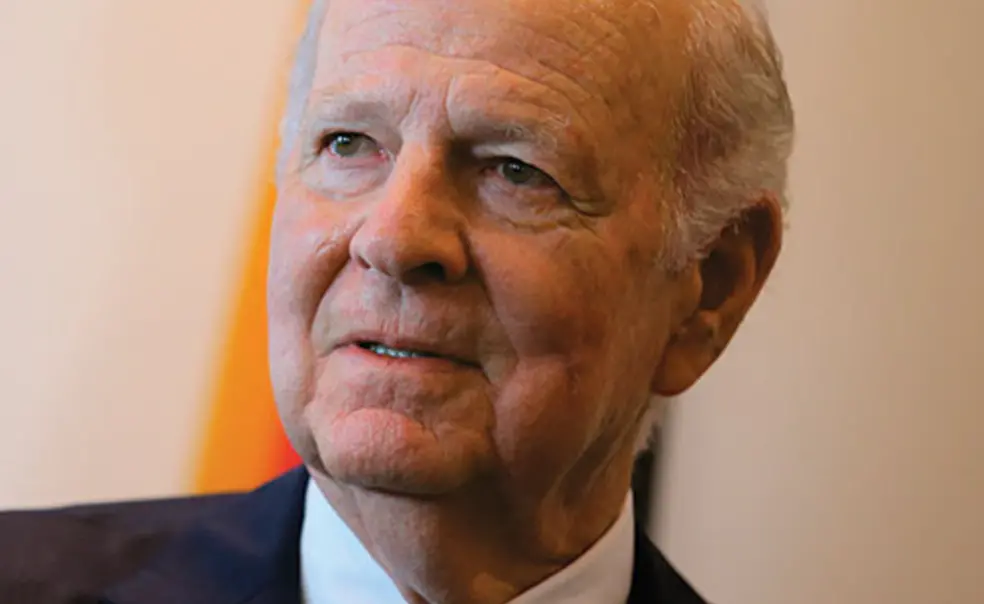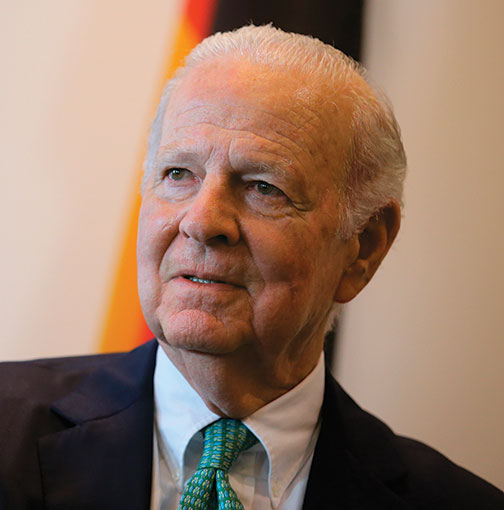James A. Baker III ’52, former secretary of state (1989–1992) and treasury (1985–1988), returned to campus in October to deliver the inaugural lecture of the Sharmin and Bijan Mossavar-Rahmani Center for Iran and Persian Gulf Studies. He spoke with PAW about Iran and the Mideast. The following is an extended version of the Q&A published in the Nov. 12, 2014, issue.
The fight against ISIS looks like another example of asymmetrical warfare. What would victory over ISIS look like?
President Obama defined it when he said that our goal is to degrade and destroy ISIS, but we’re going to have a really tough time. These people are smart, they’ve acquired a lot of resources, and they’re committed. They’re brutal, of course, but they’re good fighters. I do not think we are going to be able to degrade and destroy them with airstrikes alone. We’ll at least need to have special ops forces on the ground to guide the airstrikes and to help the Iraqi army, which so far has not proven to be of much use. So it’s going to be a long, hard slog.
Why has it been difficult to build a coalition to fight ISIS?
We haven’t been able to get anybody to put troops on the ground. We talk about training the moderate Syrian opposition, but that’s a pipe dream. First of all, I don’t know how you identify them, and if we were going to do it, we should have done it two or three years ago. It’s good that we have some of the Sunni Arab nations willing to fly air sorties, but we need to find coalition partners who are willing to put troops on the ground, because you can’t take territory from the air.
Would the American public support sending our troops back into Iraq?
No, and I’m not suggesting that we do that. This really should be the Sunni Arabs’ fight, but the truth of the matter is that it is more and more a huge civil war between the Sunnis and the Shia. Sending in large numbers of American troops would be a mistake, and I don’t think the public would accept it. But you can’t have it both ways. You can’t say we’re going to destroy ISIS, but we’re only going to do it from the air.
Did the United States withdraw its troops from Iraq too soon?
I think we did. I’m not here to argue the merits or demerits of the 2003 invasion, but one of the ironic results of that war is that the most important and influential country in Iraq today is not the United States but Iran.
It is in Iran’s interest as well to defeat ISIS. Is there an opportunity to find some common ground with the Iranians?
If you accept that winning this war will require troops on the ground, that we don’t have any available, that Turkey is not willing to put troops in, and that the Gulf states don’t have that many troops to send, I’d much rather have Iranian troops in there fighting ISIS than I would American boys and girls. The Iranians helped us in Afghanistan in 2001, so it’s not beyond the realm of possibility that they could do it again.
If we did work with the Iranians against ISIS, it would have to be done very quietly, because we would lose our Sunni Arab allies and it would create a firestorm in Congress. But I would be surprised [if] we weren’t working in concert with Iran right now at some level. There’s not one country in the world that doesn’t have an interest in seeing ISIS destroyed, so I think this would be an ideal place to build a truly effective coalition.
Does the new government in Iran provide an opportunity to improve relations?
I think the new Iranian government needs to be tested. President Rouhani says a lot of the right things, but unfortunately the real power in that country still resides with the ayatollah. Are they stringing us along in these nuclear negotiations? Who knows? I, for one, have been very much in favor of talking to the Iranians. My view is that you don’t lose anything by talking to people, even if they’re your enemies, so long as you know what you’re doing and so long as you’re tough. We’ve got a lot at stake. If the negotiations don’t work, and if our intelligence and military people come to us and say they’re about to develop nuclear weapons, then we need to do what we need to do. And that means probably using military force to talk those facilities out. Only we can do it.
How should the United States respond to Vladimir Putin’s actions in Ukraine and Crimea?
What has happened in Crimea and eastern Ukraine is totally inconsistent with any concept of a stable world order. If you don’t like what’s going on in a neighboring country, you can’t just roll the tanks. So we need to do something about it. I’m not suggesting either that we start a war in Eastern Europe, but there are many things we could do short of that. For example, I think the president should have gone into the White House briefing room and announced that he was immediately approving all applications to export liquefied natural gas. That wouldn’t have taken effect for up to a year and a half, but it would have sent the ruble into the tank and caused capital to flood out of Russia, and their economy is not very strong.
Do you miss the days when partisan politics used to stop at water’s edge?
It has been a long time since politics stopped at the water’s edge, but it has gotten worse and worse.
Protecting the American people and conducting the nation’s foreign policy are two of the major roles of government, so they are proper subjects for political debate. But the level of partisanship today really is regrettable, and it stems from several things. More and more, if Democrats control a state, they create safe Democratic districts. The same thing happens in Republican states. The center has disappeared. With the Internet, you no longer have just a 24/7 news cycle; it’s worse than that. Anybody can throw anything at the wall and sooner or later the mainstream media picks it up, and it’s just a catfight. Finally, the press has stopped being objective reporters. If you tune in to MSNBC, you’d think you were listening to the house organ of the Democratic Party. If you tune in to Fox News, you’d think you were listening to the house organ of the Republican Party. It’s constant, and I don’t think that helps promote comity and conciliation and compromise. You can win elections from the fringes, but when it comes to governing you’ve got to build consensus. That’s the way our system works.
You have been out of office for more than two decades. Do you look back on those years fondly?
One of the real joys of my old age is seeing President [George H.W.] Bush receive the praise, honor, and credit that he was due. He was our very best-ever one-term president and perhaps one of the best presidents, period. It’s wonderful for me to see him getting that recognition, because he deserves it.
Interview conducted and condensed by Mark F. Bernstein ’83













No responses yet